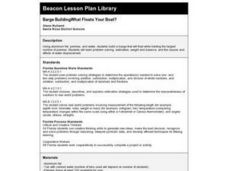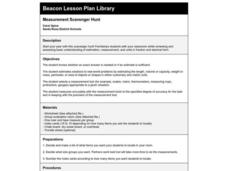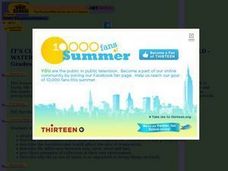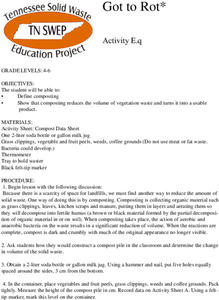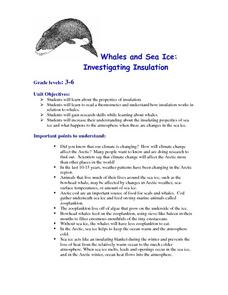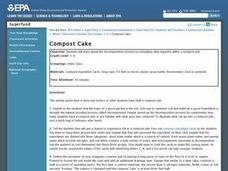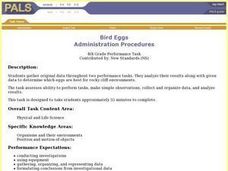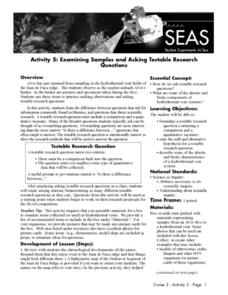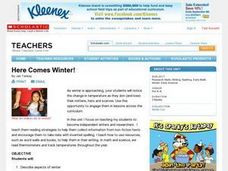Curated OER
Enzymatic Action
Students observe how a cell uses an enzyme to rid itself of a poisonous substance by experimenting with hydrogen peroxide, potatoes, liver and carrots. They record the temperature and changes of the hydrogen peroxide as other elements...
Curated OER
Barge Building: What Floats Your Boat?
Learners construct aluminum foil boats that float while holding the greatest number of pennies. They investigate the concept of water displacement, record their results, and watch a Bill Nye video on buoyancy.
Curated OER
Measurement Scavenger Hunt
Students review estimation, measurement, fractions, decimals while familiarizing themselves with a new classroom at the beginning of the year.
Curated OER
It's Clean, Fresh and only Three Billion Years Old - Water!
Students engage in a lesson plan which explores the wate cycle. They get to see some very entertaining video, do fun hands-on activities and gain a better understanding of evaporation, condensation, precipitation and collection.
Curated OER
Got to Rot
Learners make their own compost in a 2-liter jug and determine the actual volume loss in the composted material over a six-month period.
Curated OER
Classroom Meteorologists: An Experiential Approach to Learning about Seasons and Weather
Students examine several concepts about weather in the seven lessons of this unit. This year long activity helps students to gather data seasonally about wind, clouds, precipitation, and temperature. Earth's three climate zones are...
Curated OER
Earth's Energy Cycle: Albedo
Students complete all of the steps in the scientific inquiry process to study Earth's energy cycle; most specifically temperature and the effects of albedo (energy reflected back from Earth's surface) on temperature.
Curated OER
Differences between Climate and Weather
Students collect weather data over weeks, graph temperature data and compare the temperature data collected with averaged climate data where they live.
Curated OER
Explore: 5th Grade Dissolved Oxygen
Fifth graders, in groups, use basic science process skills to measure and compare the dissolved oxygen levels and pH levels of distilled, stream, and pond water.
Curated OER
Whales and Sea Ice: Investigating Insulation
Young scholars investigate the properties of insulation as it relates to whales and sea ice. They research whales and examine the atmospheric changes that occur when there are changes in sea ice.
Curated OER
Remember Our Soldiers
Students talk about and grow in their understanding of the important role our troops play, and the important role citizens play in keeping up our troops' morale. They involve themselves in community service by writing letters for, or...
Curated OER
Compost Cake
Students examine the decomposition process. They create their own class compost pile and record their observations. They discover which materials decompose at a different rate.
Curated OER
Marine & Aquatic Habitats Activities - Tidal Pools
Middle schoolers analyze the survival needs of different organisms and the conditions in a particular area that can affect these survival rates.
Curated OER
How about a Little Give and Take?
Students design a closed system to test the relationships between plants and animals. They monitor abiotic fluctuations within this living system by using a chemical test kit. They observe how living organisms respond to fluctuations in...
Curated OER
Classification
Students explore the observable properties of matter and utilize them in classification. They use a binary classification system to divide objects, then justify their scheme.
Curated OER
Classifying Candy I
Students explore the observable properties of matter. They develop two binary classification systems using concrete objects. based on two different properties of the concrete objects.
Curated OER
Bird Eggs
Students perform an experiment with different types of bird eggs to determine what factors make them strong and able to stay on a cliff without rolling off.
Curated OER
Magnetic Testing
Students explore magnetism. They make observations of everyday items regarding their magnetic attraction and use their experiences to make a prediction.
Curated OER
Color Dots 2
Students develop simple observations. They observe bleeding of colored inks with water, to understand mixtures, and to make generalized inferences from their observations.
Curated OER
Bacterial growth
Students explore the exponential growth and decay of microbial populations in relation to the organism tolerance ranges in their environment, They observe the impact of changing variables which can affect microbial populations.
Curated OER
Weather
Students explore the earth's atmosphere, weather, and climate. They begin class with a discussion about weather patterns, atmosphere, and the layers of the earth. After the class discussion, students rotate through four stations to...
Curated OER
Solar Cooking
Students experiment with a virtual solar cooker to discover the mathematical relationship among reflection, transmission and absorption. Then they actually build and test a solar cooker of their own invention.
Curated OER
Examining Samples and Asking Testable Research
Students formulate a testable research question containing a comparison and a
quantitative measure. They state the null and alternative hypothesis for a testable research question. In addition, they describe some of the abiotic
and...
Curated OER
Here Comes Winter!
Students investigate winter behaviors in animals. They describe winter and write about the characteristics of the season by drawing and labeling a winter picture. Students then conduct research on a chosen animal and create a chart. ...
Other popular searches
- Thermometer Worksheet
- Feelings Thermometer
- Reading a Thermometer
- Reading Thermometers
- Fahrenheit Thermometer
- Floating Thermometer
- Celsius Thermometer
- Blank Thermometer
- Thermometer Reading
- Using a Thermometer
- Weather Using Thermometer
- Reading Thermometers Math



